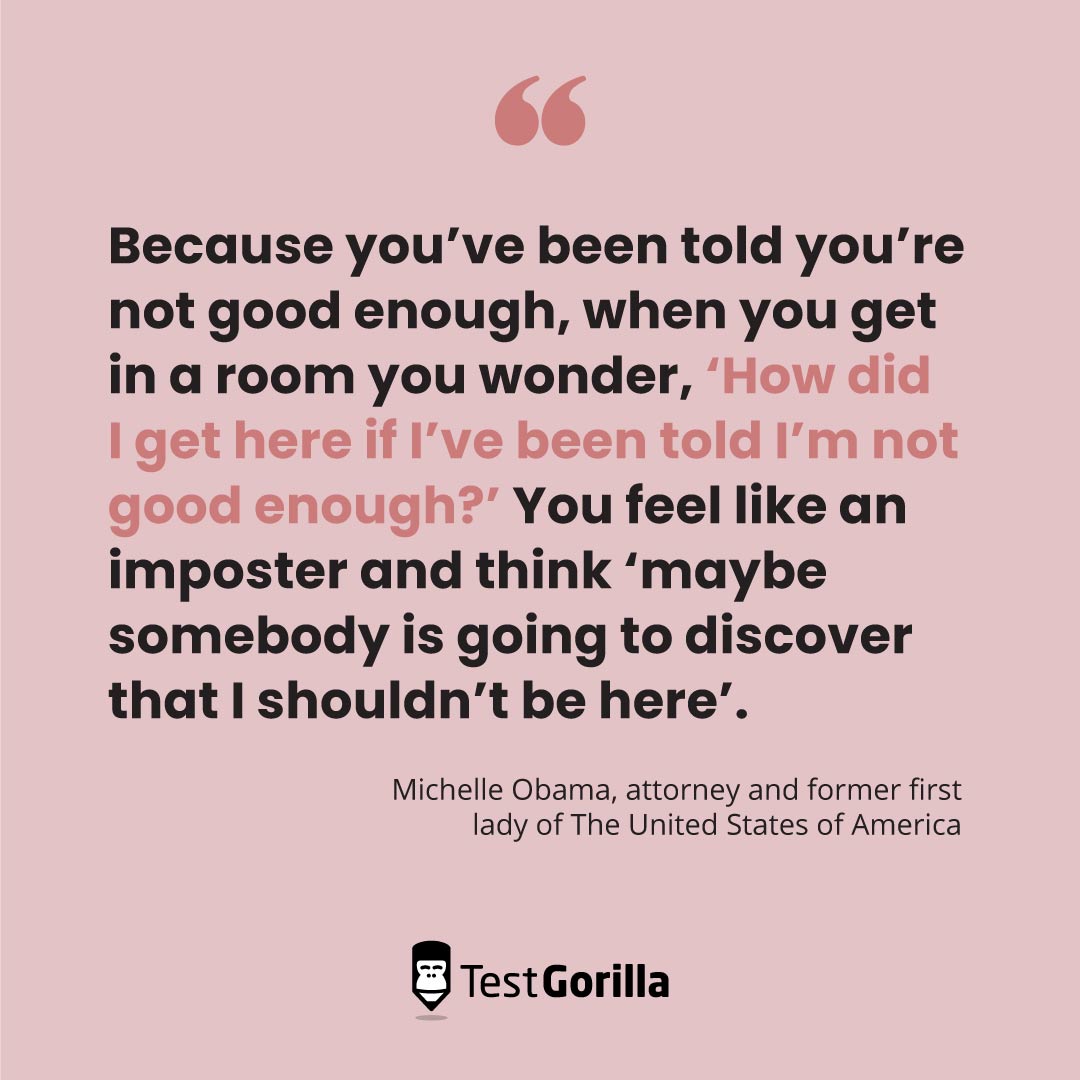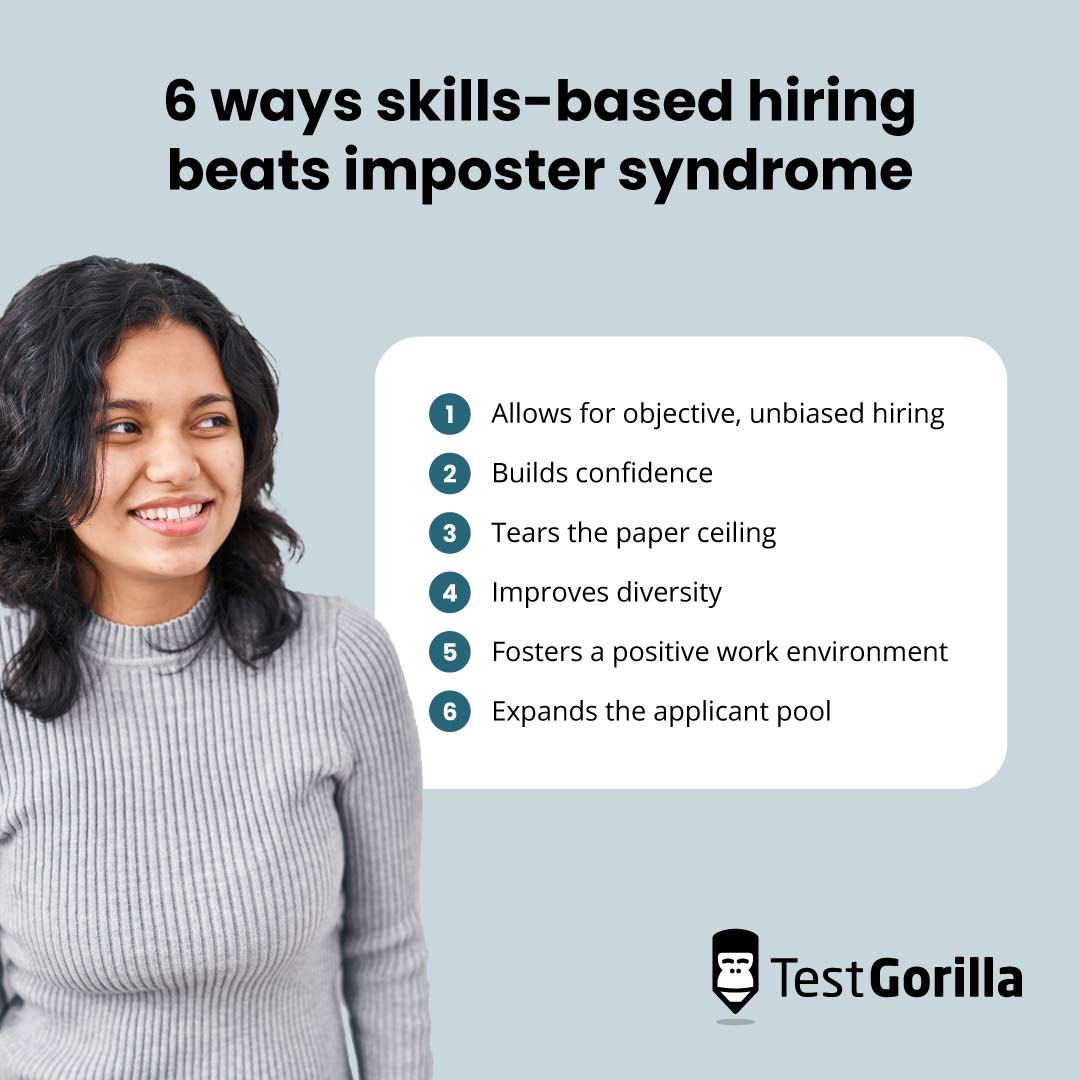How skills-based assessments can help teams overcome imposter syndrome
What comes to mind when you hear the name Albert Einstein? Physics, the theory of relativity, massive intelligence, that out-there hair? For sure, “impostor” isn’t one of the words that cross your mind. However, Einstein himself thought he was an “involuntary swindler” and believed the appraisal of his work was exaggerated.[1]
You’d never think someone who discovered the relationship between space and time would question his right to be thought of as a genius, but that’s what imposter syndrome is all about.
This phenomenon causes individuals to feel like frauds, despite any evidence to the contrary. It can affect anyone regardless of their field, gender, race, or level of expertise. However, women and marginalized groups do tend to experience it more.[2]
Imposter syndrome can be particularly detrimental to teamwork and collaborative environments. This is because it can lead to decreased productivity, self-doubt, and missed opportunities for growth.
In this article, we’ll cover how skills-based hiring can be a powerful tool in helping businesses find the right employees for the role, increase diversity, and build a culture of trust where employees don’t feel like impostors in their own workplaces.
What is the impact of imposter syndrome?
Have you ever felt like you just got lucky? Maybe you feel as though you were interviewed by the nicest hiring manager in the world, or that you just got the job because the company needed to close an urgent vacancy.
You’re certain that if you get a different line manager or switch roles, everyone will discover you’re an impostor who has no idea what they’re doing.
You’re not alone: According to a study conducted by Repec, 76.92% of people experience at least one symptom of imposter syndrome.
Imposter syndrome makes people believe they don’t have a chance at succeeding because they either lack certain positive qualities or possess undesirable ones. Another symptom includes assuming everyone else is simply better than you, and that you’re alone in feeling inadequate at work.
“The senior professionals in my company are some of the most talented software engineers in Spain, they all worked at the most successful companies in the noughties and now they just take projects they like. I often worry that I’m not qualified enough to work with them and soon they’ll notice I’m really bad at my job – even when I’m consistently delivering value to the team,” Jose Luis Colmenares, data engineer.
This phenomenon is usually rooted either in an unrealistic perception of others, or is a result of internalized negative beliefs about your own capacities and person.[3]
The second reason is particularly true for minorities. “Because you’ve been told you’re not good enough, when you get in a room you wonder, ‘How did I get here if I’ve been told I’m not good enough?’ You feel like an imposter and think ‘maybe somebody is going to discover that I shouldn’t be here’,” says Michelle Obama, attorney and former first lady of The United States of America.
Women, black, indigenous and people of color (BIPOC), lesbian, gay, bisexual, transgender, and queer (LGBTQ+) individuals, and other underrepresented groups are more likely to suffer from imposter syndrome. This is because there’s a correlation between feeling like an imposter and being the victim of microaggressions or subtle discrimination.[2]
Imposter syndrome can lead employees to feel anxious, overwhelmed, insecure, and unmotivated. This affects performance, causes people to burn out or quit, and contributes to poor or no diversity in executive positions.
However, there is a solution at hand, which we’ll cover next.
6 ways skills-based hiring beats imposter syndrome
Skills-based hiring lets you assess people based on what they can do, not who they are or where they came from. This helps candidates and team members grow in confidence and overcome imposter syndrome because they know they’re definitely the best fit for the role.
Let’s break down how skills-based hiring can help you and your team beat the imposter phenomenon.
1. Allows for objective, unbiased hiring
Your next great hire may not be waiting in that pile of resumes. If they think they lack the necessary qualifications and experience, they might not have bothered to apply.
Resumes are a compilation of your formal experience but it can be hard to share an accurate description of everything you can do. “I think my CV is a nice representation of my experience and hard skills but not so much my soft skills – my job is a mix of these two,” says Michel Hauzeur, head of product at Uruit.
Elena Gonzalez, sales and marketing manager for the Caribbean division at a brewery, agrees: “If a hiring manager comes across my resume in a pile, I don’t think it would stand out. It doesn’t reflect the kind of person I am.”
Often, people with imposter syndrome also don’t feel comfortable “selling” themselves or their achievements and may diminish them. “I don’t like to take ownership of the things I’ve done,” says Elena. “Let’s say I draw a beautiful flower, if someone compliments it, I’ll feel the urge to say ‘thanks, but [someone] lent me the pen’.”
Skills-based talent assessments address these challenges and makes recruiting more objective. This is because they help you evaluate individuals for their skills rather than their ability to market themselves. It also lets you access a wider, more diverse talent pool than otherwise, including those who haven’t followed traditional education paths or have gaps in their resumes.
2. Builds confidence
People with imposter syndrome don’t necessarily experience it at all times or in all aspects of their lives, but it can rear its ugly head when they change career paths or roles.
Skills-based hiring overcomes this because it gives candidates the chance to show, rather than tell, their skills right at the start of the hiring process.
When you put people’s skills to the test, they can shine. It helps them feel more comfortable about their abilities and confident about being the right person for the job. If a candidate does well in the assessment, the cold, hard evidence that they deserve a shot at the job is there in front of them.
“I’ve always felt more confident when applying for jobs with skills-based assessments and multiple interviews. If I passed a screening or a test, I would be more self-assured in the next round of interviews,” says Maria Belén Daboin, brand manager at Glow.
3. Tears the paper ceiling
Skilled through alternative routes (STAR) individuals are on the rise and formal education is no longer the only way to reach certain corporate roles.
STARs account for 50% of the US workforce but companies are now asking for more and higher certifications for certain roles – this is called degree inflation. This makes it hard for people from marginalized groups to reach certain positions despite having the right skills and it takes longer for companies to close vacant roles.
A long list of qualifications for job openings contributes to imposter syndrome and can cause people to immediately disregard applying for a role if they don’t meet all the requirements.
Skills-based assessments let you evaluate candidates based on their expertise, not their certifications. This tears the ‘paper ceiling’ – a term that describes the impact unnecessary degree requirements have on equality of opportunity.
4. Improves diversity
“Truth and the right answer come from a diversity of experiences,” says Michelle Obama. Translated to business, this means that the broader the range of perspectives, skills, and experience you have, the better your problem-solving, creativity, and innovation.
The best way to build a diverse workforce that can transform your business is to increase representation and reduce biases in the hiring process.
However, people from underrepresented groups are often told they’re “not good enough,” so it’s no surprise that they experience imposter syndrome the most. This can cause them to hold back from applying or underperform in interviews.
To get a diverse workforce, you need to ensure a mixed talent pipeline. However, you’ll struggle to achieve this if you stick to traditional hiring practices. Like we discussed above, if you only recruit people based on having a four-year degree, you’re excluding skilled workers like STARs.
91.1% of organizations have experienced an increase in diversity because of skills-based hiring.
Improved diversity can combat impostor syndrome because representation is crucial if you want employees from underrepresented groups to feel confident and empowered. If candidates see people like themselves in your workplace, it’s likely to ease some of their anxieties.
5. Fosters a positive work environment
By changing the focus from qualifications and achievements to skills, you create a meritocracy that positively impacts the work environment. This reduces people’s insecurities about not deserving their role and boosts confidence. When people feel confident and supported by the company, they’re more likely to contribute ideas and work well with others.
All of this results in a positive work environment and a culture of trust. Your team will have more trust in business decisions when they know the best-qualified people are making those calls, and knowing that their own skills will be rewarded fairly can be an antidote to impostor syndrome.
Skills-based hiring can also increase engagement and retention rates because you’re placing the right people in the right roles – making them happier and more productive. In fact, 91.2% of organizations saw an increase in retention with skills-based hiring.
6. Expands the applicant pool
Men are more likely than women to apply for jobs they aren’t 100% qualified for, and this is largely due to impostor syndrome. This means you could be missing out on some very talented women because they don’t believe they’re qualified.
However, when you eliminate outdated resumes and mandatory degree requirements, you open up opportunities to a wider, more diverse talent pool. Using skills-based hiring also removes the challenges faced by working mothers who may have gaps on their resumes due to childcare.
The best insights on HR and recruitment, delivered to your inbox.
Biweekly updates. No spam. Unsubscribe any time.
Help candidates and employees overcome impostor syndrome with skills-based hiring
Even superstars like Einstein and Michelle Obama felt like frauds at some point in their careers. This feeling is often more prevalent in marginalized groups that have long been told they’re not good enough. This makes them grow up doubting their right to a seat at the table, and it means you could be missing out on top diverse talent.
Imposter syndrome causes people to doubt their abilities, undersell themselves, or have an unhealthy sense of perfectionism that can lead to burnout. This phenomenon also hurts your business when it results in a reduction in teamwork, efficiency, and diversity.
If you follow a traditional hiring approach, you could be excluding these candidates, many of whom may not even apply if they don’t have all the required qualifications.
Skills-based hiring levels the playing field for diverse candidates by letting you fairly assess people based on skills and abilities. This reduces hiring biases, builds candidate and employee confidence, validates peoples’ expertise, improves diversity, and expands your applicant pool. When you do all that, you can also build a culture of trust and a positive work environment where everyone feels included.
Beat imposter syndrome with objective hiring methods. Talent assessments reduce bias in the hiring process by letting you hire the right people for the job, every time. Download the State of Skills-based Hiring 2022 report to learn more. |
Sources
“Albert Einstein” (2019) Retrieved on July 19th, 2023. https://iawia.net/observations/albert-einstein-3/
“Microaggressions, Imposter Phenomenon, and People of Color: A Quantitative Analysis” (2022) Retrieved on July 19, 2023. https://academicworks.cuny.edu/cgi/viewcontent.cgi?article=6030&context=gc_etds
“What Is Imposter Syndrome?” (2022) Retrieved on July 18th, 2023. https://www.webmd.com/balance/what-is-imposter-syndrome
“Gender Insights Report” (ND). Retrieved on July 19th, 2023. https://business.linkedin.com/content/dam/me/business/en-us/talent-solutions-lodestone/body/pdf/Gender-Insights-Report.pdf
Related posts
You've scrolled this far
Why not try TestGorilla for free, and see what happens when you put skills first.

















